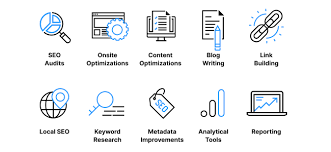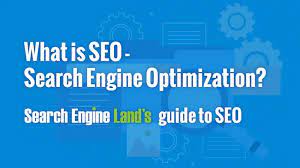The Power of SEO in Internet Marketing
In the ever-evolving landscape of digital marketing, Search Engine Optimization (SEO) has emerged as a crucial tool for businesses looking to enhance their online presence and reach a wider audience. SEO plays a pivotal role in internet marketing strategies, helping websites rank higher in search engine results pages and attract organic traffic.
One of the key benefits of SEO is its ability to improve visibility. By optimising website content with relevant keywords, meta tags, and quality backlinks, businesses can increase their chances of appearing at the top of search engine results. This not only boosts website traffic but also enhances brand credibility and trust among users.
Furthermore, SEO helps businesses target specific audiences based on their search intent. By understanding user behaviour and preferences, businesses can tailor their content to meet the needs of their target market effectively. This targeted approach not only drives qualified leads but also improves conversion rates.
Another significant advantage of SEO is its cost-effectiveness compared to traditional marketing methods. With SEO, businesses can achieve long-term results without having to invest in expensive advertising campaigns. By consistently optimising their website and producing high-quality content, businesses can maintain a strong online presence and stay ahead of competitors.
In conclusion, SEO is a powerful tool that can significantly impact an organisation’s internet marketing efforts. By implementing effective SEO strategies, businesses can improve their online visibility, attract relevant traffic, and ultimately drive business growth. In today’s competitive digital landscape, harnessing the power of SEO is essential for staying ahead and reaching new heights in internet marketing.
Essential FAQs on SEO and Internet Marketing: A Comprehensive Guide
- What is SEO marketing examples?
- What are the 7 types of SEO?
- How is SEO used in marketing?
- How to use SEO in online marketing?
- What is SEO in internet marketing?
- What is SEO marketing and how it works?
- What is SEO & How it works?
- What are the 5 important concepts of SEO?
- What are 3 main areas of SEO?
- What are SEO tools?
- What are the 3 types of SEO?
- What is SEO and how does it work?
- Why is SEO important in Internet marketing?
- What is SEO and why is it important?
What is SEO marketing examples?
When it comes to SEO marketing examples, there are various strategies and tactics that businesses can employ to enhance their online visibility and attract more organic traffic. One common example is the use of targeted keywords in website content and meta tags to improve search engine rankings. Another example is creating high-quality backlinks from reputable websites to boost domain authority and credibility. Additionally, optimising website loading speed, mobile responsiveness, and user experience are essential SEO marketing examples that can positively impact a brand’s online presence and overall digital marketing efforts.
What are the 7 types of SEO?
When it comes to SEO in internet marketing, understanding the different types of SEO is crucial for developing a comprehensive strategy that can boost online visibility and drive organic traffic. The 7 types of SEO include on-page SEO, off-page SEO, technical SEO, local SEO, mobile SEO, e-commerce SEO, and voice search SEO. Each type focuses on specific aspects of website optimisation and content strategy to improve search engine rankings and enhance user experience. By incorporating these diverse approaches into a cohesive SEO plan, businesses can maximise their online presence and effectively connect with their target audience.
How is SEO used in marketing?
SEO is a fundamental component of modern marketing strategies, playing a vital role in enhancing online visibility and driving organic traffic to websites. Businesses utilise SEO techniques such as keyword optimisation, content creation, and link building to improve their search engine rankings and attract relevant audiences. By aligning website content with user search intent and industry trends, SEO helps businesses connect with their target market effectively. Furthermore, SEO enables businesses to establish credibility and trust with users by providing valuable and authoritative information. Overall, integrating SEO into marketing efforts is essential for maximising online presence, increasing brand awareness, and ultimately driving business growth in the competitive digital landscape.
How to use SEO in online marketing?
When it comes to incorporating SEO into online marketing strategies, the key lies in understanding and implementing best practices to enhance visibility and drive organic traffic to your website. Start by conducting thorough keyword research to identify relevant terms and phrases that your target audience is searching for. Optimise your website content, including meta tags, headings, and image alt text, with these keywords to improve search engine rankings. Additionally, focus on creating high-quality, engaging content that provides value to users and encourages them to stay on your site. Building quality backlinks from reputable sources can also boost your site’s authority and credibility in the eyes of search engines. By consistently monitoring performance metrics and making data-driven adjustments, you can refine your SEO strategy for optimal results in online marketing efforts.
What is SEO in internet marketing?
Search Engine Optimization (SEO) in internet marketing refers to the practice of enhancing a website’s visibility and ranking on search engine results pages through various strategies and techniques. SEO involves optimising website content, improving site structure, and building quality backlinks to increase organic traffic from search engines like Google. By effectively implementing SEO tactics, businesses can improve their online presence, attract relevant visitors, and ultimately drive conversions. SEO is a fundamental aspect of internet marketing that helps businesses reach their target audience and achieve sustainable growth in the digital landscape.
What is SEO marketing and how it works?
SEO marketing, short for Search Engine Optimization marketing, is a strategic approach aimed at improving a website’s visibility and ranking on search engine results pages. By optimising various elements such as content, keywords, meta tags, and backlinks, SEO marketing works to enhance a website’s relevance and authority in the eyes of search engines like Google. This, in turn, helps attract organic traffic and target specific audiences based on their search intent. Ultimately, SEO marketing is about creating a seamless user experience through relevant and valuable content that not only drives traffic but also boosts brand credibility and trust online.
What is SEO & How it works?
When it comes to internet marketing, a frequently asked question is, “What is SEO and how does it work?” SEO, or Search Engine Optimization, is the practice of enhancing a website’s visibility on search engine results pages through organic methods. It involves optimising various elements of a website, such as content, keywords, meta tags, and backlinks, to improve its ranking on search engines like Google. By focusing on relevance and user experience, SEO aims to attract more organic traffic to a website and increase its online presence. Understanding how SEO works is essential for businesses looking to maximise their digital marketing efforts and reach their target audience effectively.
What are the 5 important concepts of SEO?
When it comes to SEO in internet marketing, understanding the five important concepts is crucial for achieving success in online visibility and search engine rankings. The first concept is keyword research, which involves identifying relevant keywords that align with user search queries. On-page optimization is another key concept, focusing on optimizing website content, meta tags, and internal links for improved search engine visibility. Off-page optimization involves building quality backlinks from reputable sources to enhance website authority. Technical SEO ensures that the website is easily crawlable and indexable by search engines. Lastly, content quality and relevance play a vital role in engaging users and boosting organic traffic. Mastering these five concepts of SEO can significantly impact a website’s performance and overall digital marketing strategy.
What are 3 main areas of SEO?
When it comes to SEO in internet marketing, understanding the three main areas is essential for a successful strategy. The first key area is on-page SEO, which involves optimising individual web pages with relevant keywords, meta tags, and high-quality content to improve search engine rankings. The second crucial aspect is off-page SEO, focusing on building authoritative backlinks from reputable websites to enhance a site’s credibility and domain authority. Lastly, technical SEO plays a vital role in ensuring that a website is optimised for search engine crawlers, including factors such as site speed, mobile-friendliness, and structured data markup. By addressing these three main areas of SEO comprehensively, businesses can effectively boost their online visibility and drive organic traffic to their websites.
What are SEO tools?
SEO tools are essential resources that assist businesses in optimising their online presence and improving their search engine rankings. These tools encompass a wide range of functionalities, from keyword research and competitor analysis to website auditing and performance tracking. By leveraging SEO tools, businesses can gain valuable insights into their website’s performance, identify areas for improvement, and implement strategies to enhance their visibility in search engine results pages. With the help of these tools, businesses can streamline their SEO efforts, monitor their progress, and make data-driven decisions to achieve optimal results in internet marketing campaigns.
What are the 3 types of SEO?
When delving into the realm of SEO in internet marketing, one frequently asked question revolves around the classification of SEO into three main types. The three primary types of SEO are on-page SEO, off-page SEO, and technical SEO. On-page SEO focuses on optimising individual web pages to improve search engine rankings and attract organic traffic. Off-page SEO involves activities conducted outside the website to enhance its authority and relevance in the digital landscape. Technical SEO, on the other hand, deals with the backend elements of a website to ensure optimal crawling and indexing by search engines. Understanding these three types of SEO is essential for creating a comprehensive and effective digital marketing strategy that maximises online visibility and engagement.
What is SEO and how does it work?
SEO, or Search Engine Optimization, is a fundamental aspect of internet marketing that focuses on improving a website’s visibility and ranking on search engine results pages. In essence, SEO involves a series of strategies and techniques aimed at enhancing a website’s relevance and authority in the eyes of search engines like Google. By optimising various elements such as content, keywords, meta tags, and backlinks, SEO helps search engines understand the context and value of a website’s content. This, in turn, allows search engines to deliver more accurate and relevant results to users searching for specific information or services online. Ultimately, the goal of SEO is to increase organic traffic to a website by making it more visible and accessible to potential visitors through improved search engine rankings.
Why is SEO important in Internet marketing?
In the realm of internet marketing, the question of why SEO is important often arises due to its fundamental role in enhancing online visibility and driving organic traffic to websites. SEO is crucial in internet marketing as it enables businesses to improve their search engine rankings, making it easier for potential customers to discover their products or services. By optimising website content with relevant keywords and quality backlinks, businesses can increase their online presence and credibility, ultimately leading to higher conversion rates and sustainable growth. In essence, SEO serves as a cornerstone of successful internet marketing strategies by helping businesses connect with their target audience effectively and stand out in the competitive digital landscape.
What is SEO and why is it important?
Search Engine Optimization (SEO) is a fundamental aspect of internet marketing that focuses on improving a website’s visibility and ranking in search engine results. SEO involves various strategies such as keyword research, on-page optimization, link building, and content creation to enhance a website’s relevance and authority in the eyes of search engines like Google. The importance of SEO lies in its ability to drive organic traffic to a website, increase brand visibility, and establish credibility among users. By optimising for search engines, businesses can reach their target audience more effectively, improve user experience, and ultimately achieve higher conversion rates. In today’s competitive online landscape, investing in SEO is crucial for staying ahead of the competition and maximising the potential of digital marketing efforts.




